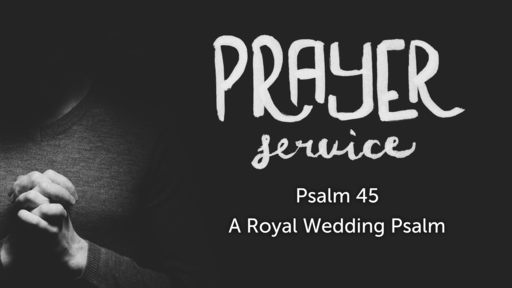Commending the King and Queen to Ideal Rule
Notes
Transcript
Bethel Baptist Church,
Laramie, WY
Sunday, Apr 15, 2020
OUTLINE:
Shortened and Barrowed from Allen Ross
Pastor Nathan Sehi
This Psalm encourages an unnamed Davidic King and Queen on
their wedding day to faithfully rule Israel before God. It praises the ideal
King and the ideal queen. This Psalm has elements that ultimately point us
to Christ as the ideal King and husband.
Psalm 45 – Commending the King and Queen to Ideal Rule
Ross: This royal psalm was a hymn to be sung on the wedding day. One can
picture the king seated on his throne with the new queen by his side, and the
poet reciting this ode to them in the court. The first nine verses are directed to
the king first, as would have been customary in an oriental royal setting. In this
section the poet pours out inspiring words that he cannot contain, lauding the
king for his transcendent beauty, grace, valor, majesty, power and
righteousness. It is obvious to him that God has blessed the king with these
qualities. He concludes the praise section with a description of the king in all
his wedding-day finery.
Author: Korahites (Plural)
Structure: A strophe Psalm
Cross References: Hebrews 1:8-9, Revelation 19:6-9, Ephesians 5:32.
1) The Ideal Rulers – King and Queen.
A. A King should champion truth, humility, and righteousness. (v. 4)
B. A Queen should cleave to Israel and honor her husband. (v. 10-11)
2) The Ideal Marriage – Husband and Wife.
A. Husbands should champion truth, humility, and righteousness. (v. 4)
B. Wives should cleave and honor their husband. (v. 10-11)
3) The Truly Ideal King and Husband – Jesus Christ.
A. Jesus is the only true contender for truthful and equally humble, and
righteous.
B. Jesus is the greatest husband we could ever have.
I. The psalmist praises the royal bridegroom on his wedding day for
his splendor, majesty, and righteousness (1–9).
A. The psalmist explains the character of his work (1).
B. The psalmist praises the king (2–9).
1. He is transcendent and excellent in his person (2).
2. He is a mighty man of valor (3–5).
3. He is righteous in his administration (6–7).
4. He is joyfully blessed on his wedding day (8–9).
II. The psalmist reports how he counseled the bride on attaining the
king’s approval, and then observes how she is conducted to the
palace (10–15).
A. The psalmist charged her to forget her own people and
concentrate on pleasing her new lord (10–12).
1. He emphasized the commission (10).
2. He instructed her to do homage to her lord, forsaking her
family (11).
3. He foretold the far-reaching blessings if she obeyed (12).
B. The psalmist describes the queen in her glorious apparel as she
is conducted to the palace (13–15).
III. The psalmist pronounces a benediction (16–17).
A. He predicts the prosperity of the marriage (16).
B. He predicts universal and everlasting remembrance of the king
(17).
Questions
1) What does this passage teach about leadership? How can you apply
these Leadership principles?
2) What does this passage teach about an ideal marriage? How can you
apply these marriage principles?
3) In what way does this teach the majesty and splendor of Christ?

